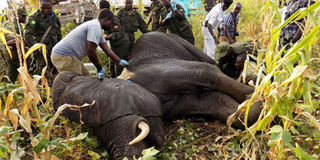Relief as stray elephant is captured

End of road. UWA staff and police officers prepare to load the captured stray elephant on to a track before transporting it back to Queen Elizabeth National Park in Kasese District on Friday. PHOTO BY MORIS MUMBERE
What you need to know:
- Nightmare. The wild beast had since November 3 been cited strolling through people’s gardens
Kasese.
It was all jubilation in Kasese Town last Friday after an elusive elephant that was terrorising farmers in Kihara ward in Kasese Municipality was finally captured and returned to Queen Elizabeth National Park.
For more than a month, the gigantic animal has been roaming Kihara ward destroying people’s crops and causing fear among residents.
The three-hour operation that culminated into the capture of the animal was commanded by Uganda Wildlife Authority (UWA) and police led by the chief warden of Queen Elizabeth Conservation Area, Mr Edward Esalu after the team cordoned off a maize garden off the Kihara road, west of Kasese District headquarters at Rukooki.
The stray elephant had since November 3 been cited strolling through people’s gardens, especially in tall maize fields, making it difficult for farmers to attend to their gardens to harvest their crops.
UWA staff had made several attempts to drive back the wild animal to the park but to no avail.
In an attempt to drive the largest land mammal back to the park, UWA officials fired in the air to scare it but instead two residents were injured by stray bullets.
How the elephant was captured
The Rwenzori Mountains National Park Conservation manager, Mr James Okware, narrates: “I shot the elephant with a tranquiliser, which immobilised it and put it to sleep before we captured it”.
Later, UWA used a crane to lift the animal onto a truck that drove the elephant back to Queen Elizabeth National Park.
As the wild animal was being driven through Kasese Town, residents jubilated and thanked UWA for saving them from the menace.
Some demanded that the animal be given to them as a Christmas gift to feast on to compensate them for the various crops it had destroyed.
Ms Juliet Masika, 32, a mother of seven, said she did not know where to start after the animal devastated her only acre of crops in Kyondo village.
Kihara Road village chairman, Mr Jostus Sunday, said the affected residents in his area had already started seeking legal redress to have them compensated for their lost crops.
Describing the whole debacle as “horrible”, Ms Night Mbambu, a resident, said she had lost her job as a casual labourer because she could nolonger access people’s gardens where she had been providing labour to earn a living.
Ms Grace Kabugho, one of the farmers whose garden was destroyed by the elephant, said they had abandoned their gardens for fear for their lives.
“We lost our crops to the elephant that strayed into our gardens since last month. We feared to come to the gardens since the elephant is dangerous and could harm or kill us,” she said.
Mr Marahi Muhindo, a cotton farmer in the affected village, said: “We have lost our crops to wild animals for a long time but nothing has ever been done. We want the President to solve the problem or else we devise other means”
Mr Kisuki Saidi, the Nyamwamba Division chairperson, said many people in the area have lost their crops to wild animals.
However, UWA spokesperson Simplicious Gessa regretted the inconveniences caused in the area in an attempt to drive the wild animal back to its habitat.
Farmers abandon homes to guard their gardens
The elephant has been taken back to the park, but the misery in other areas continues as the human-wildlife conflict goes on.
Most farmers along Muhokya-Kinyamaseke-Bwera road sleep out in the cold guarding their gardens from wild animals from Queen Elizabeth National Park, which they say destroy their farms during night hours.
Mr Happy Muhindo, a commercial farmer at Kaleberyo in Muhokya Sub-county, said: “Most families have shifted from their homes to camp in their gardens to guard against wild animals by lighting fire to scare them away.”
Mr Muhindo added that the act has largely affected the education of the young children.
“Education of young ones in such areas has been affected due to the night operations that the children go through”.
He urged UWA to address the matter immediately.
The most affected areas are Muhokya, Kaleberyo, Kahendero, Kikorongo, Kiburara, Katholhu and Nyamughasani, all in Kasese District.
Recently, Daily Monitor carried a story, “Museveni warns UWA boss on stray animals” where the President warned Mr Andrew Segguya, the UWA executive director, over his alleged failure to address wildlife invasion into community farmlands.
Mr Museveni said despite continuous reminder to Mr Segguya to have the problems addressed, he [Segguya] and his team have instead been ‘sleeping’.
“The director of UWA needs some kiboko [canes], we have been talking about the issues of wild animals invading people’s gardens for about 10-15 years now, but nothing has been done to address the problem,” he said.
The President made the remarks while reacting to a submission of Nwoya District chairperson Patrick Okello Oryema at the launch of a 2,000 hectares rice farm belonging to FOL Logistics Uganda Ltd, in Anaka Sub-county at the weekend.
Compiled by Moris Mumbere, Enid Ninsiima & Felix Basiime




